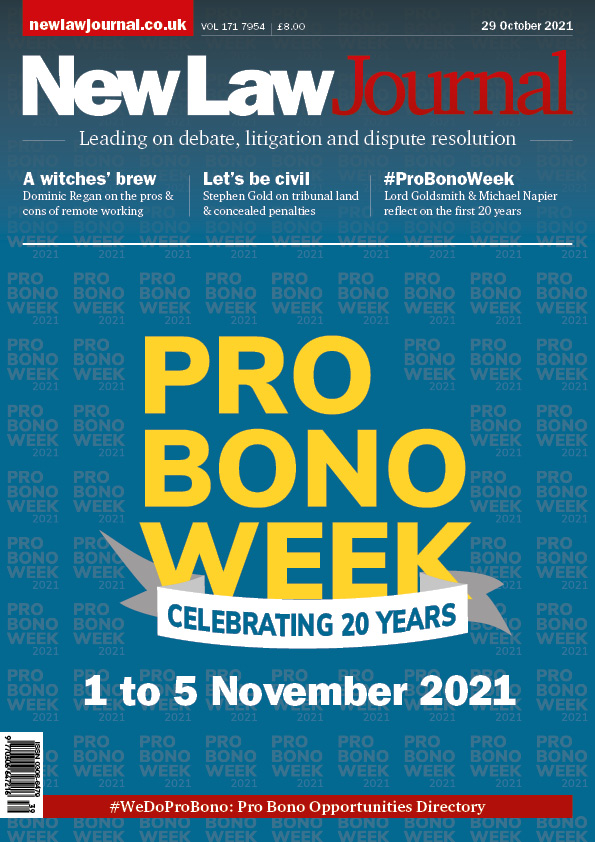THIS ISSUE

Lawyers up and down the country are preparing for the 20th anniversary Pro Bono Week (1-5 November)
Pro bono work is always rewarding but some cases stay with you forever. Writing in this week’s NLJ, Jessica Dunk, associate, Ropes & Gray, recounts her involvement in one such case―that of Andrew Malkinson
What are the pros and cons of remote working? There are many, writes NLJ columnist and City Law School professor Dominic Regan.
Fiona Rutherford, director, access to justice policy, Ministry of Justice, lauds the tradition of pro bono in the legal profession, in this week’s NLJ, as part of a special pro bono edition to mark the 20th anniversary of Pro Bono Week
Trial durations are overestimated, according to research among members of the judiciary, former District Judge Stephen Gold writes in this week’s ‘Civil way’.
Increased use of simple online wills could lead to a surge in unsuitable and contested wills, a funeral research and consultancy firm has predicted
The Law Society and City of London Law Society have pledged to hold the government to account over its economic crime levy, due to begin next year
An extra clause addressing affirmative cyber cover is to be added to the minimum terms and conditions for professional indemnity insurance, the Solicitors Regulation Authority (SRA) has announced
The ever-popular Will Aid returns this November, with potential benefits for both firms and charities
Adoption of the ‘arbitration annex’ at COP26, in Glasgow next week, would encourage states to act on their climate and environmental obligations, according to lawyers
MOVERS & SHAKERS

Jurit LLP—Caroline Williams
Private wealth and tax team welcomes cross-border specialist as consultant
.tmb-mov69x69.jpg?sfvrsn=961ae4db_1)
HFW—Simon Petch
Global shipping practice expands with experienced ship finance partner hire
95ca96e3d47f4eff8d147c4f0df17c77.tmb-mov69x69.png?sfvrsn=3db5d86b_1)
Freeths—Richard Lockhart
Infrastructure specialist joins as partner in Glasgow office
NEWS
Talk of a reserved ‘Welsh seat’ on the Supreme Court is misplaced. In NLJ this week, Professor Graham Zellick KC explains that the Constitutional Reform Act treats ‘England and Wales’ as one jurisdiction, with no statutory Welsh slot
The government’s plan to curb jury trials has sparked ‘jury furore’. Writing in NLJ this week, David Locke, partner at Hill Dickinson, says the rationale is ‘grossly inadequate’
A year after the $1.5bn Bybit heist, crypto fraud is booming—but so is recovery. Writing in NLJ this week, Neil Holloway, founder and CEO of M2 Recovery, warns that scams hit at least $14bn in 2025, fuelled by ‘pig butchering’ cons and AI deepfakes
After Woodcock confirmed no general duty to warn, debate turns to the criminal law. Writing in NLJ this week, Charles Davey of The Barrister Group urges revival of misprision or a modern equivalent
Family courts are tightening control of expert evidence. Writing in NLJ this week, Dr Chris Pamplin says there is ‘no automatic right’ to call experts; attendance must be ‘necessary in the interests of justice’ under FPR Pt 25







